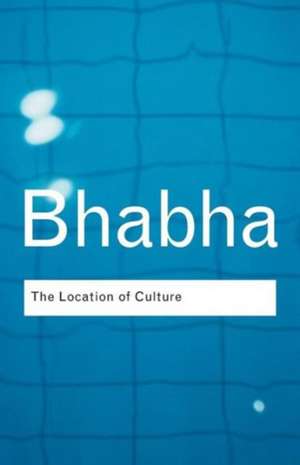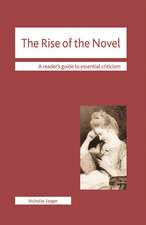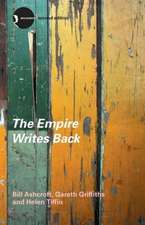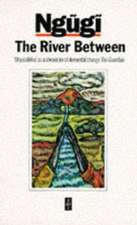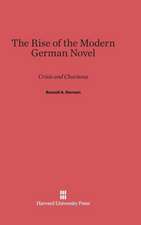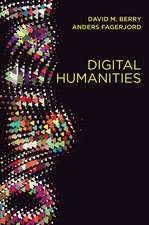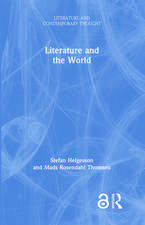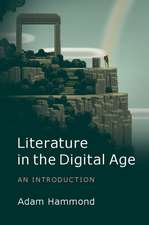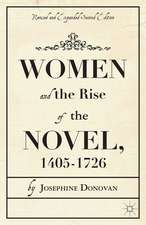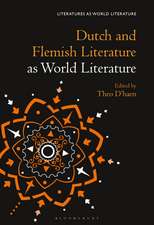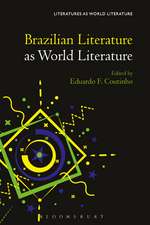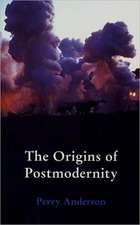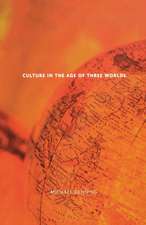The Location of Culture: Routledge Classics
Autor Homi K. Bhabhaen Limba Engleză Paperback – sep 2004
| Toate formatele și edițiile | Preț | Express |
|---|---|---|
| Paperback (1) | 153.71 lei 22-36 zile | +19.43 lei 5-11 zile |
| Taylor & Francis – sep 2004 | 153.71 lei 22-36 zile | +19.43 lei 5-11 zile |
| Hardback (1) | 1064.98 lei 43-57 zile | |
| Taylor & Francis – 10 feb 1994 | 1064.98 lei 43-57 zile |
Din seria Routledge Classics
- 5%
 Preț: 132.94 lei
Preț: 132.94 lei -
 Preț: 101.17 lei
Preț: 101.17 lei - 5%
 Preț: 89.26 lei
Preț: 89.26 lei -
 Preț: 113.15 lei
Preț: 113.15 lei -
 Preț: 145.76 lei
Preț: 145.76 lei -
 Preț: 125.23 lei
Preț: 125.23 lei -
 Preț: 108.21 lei
Preț: 108.21 lei - 5%
 Preț: 88.43 lei
Preț: 88.43 lei -
 Preț: 124.19 lei
Preț: 124.19 lei -
 Preț: 109.91 lei
Preț: 109.91 lei -
 Preț: 123.98 lei
Preț: 123.98 lei -
 Preț: 121.89 lei
Preț: 121.89 lei -
 Preț: 93.84 lei
Preț: 93.84 lei -
 Preț: 109.24 lei
Preț: 109.24 lei -
 Preț: 86.93 lei
Preț: 86.93 lei -
 Preț: 95.54 lei
Preț: 95.54 lei -
 Preț: 92.66 lei
Preț: 92.66 lei -
 Preț: 138.48 lei
Preț: 138.48 lei -
 Preț: 146.52 lei
Preț: 146.52 lei -
 Preț: 94.66 lei
Preț: 94.66 lei -
 Preț: 110.69 lei
Preț: 110.69 lei -
 Preț: 92.77 lei
Preț: 92.77 lei -
 Preț: 110.32 lei
Preț: 110.32 lei -
 Preț: 64.19 lei
Preț: 64.19 lei -
 Preț: 122.91 lei
Preț: 122.91 lei -
 Preț: 123.12 lei
Preț: 123.12 lei -
 Preț: 111.10 lei
Preț: 111.10 lei -
 Preț: 86.43 lei
Preț: 86.43 lei -
 Preț: 144.60 lei
Preț: 144.60 lei -
 Preț: 123.35 lei
Preț: 123.35 lei -
 Preț: 121.87 lei
Preț: 121.87 lei -
 Preț: 109.98 lei
Preț: 109.98 lei -
 Preț: 108.06 lei
Preț: 108.06 lei -
 Preț: 93.49 lei
Preț: 93.49 lei -
 Preț: 123.12 lei
Preț: 123.12 lei -
 Preț: 125.12 lei
Preț: 125.12 lei -
 Preț: 124.13 lei
Preț: 124.13 lei -
 Preț: 136.69 lei
Preț: 136.69 lei -
 Preț: 108.18 lei
Preț: 108.18 lei -
 Preț: 122.91 lei
Preț: 122.91 lei -
 Preț: 122.91 lei
Preț: 122.91 lei -
 Preț: 109.31 lei
Preț: 109.31 lei -
 Preț: 123.89 lei
Preț: 123.89 lei -
 Preț: 93.89 lei
Preț: 93.89 lei -
 Preț: 94.30 lei
Preț: 94.30 lei -
 Preț: 123.03 lei
Preț: 123.03 lei -
 Preț: 139.32 lei
Preț: 139.32 lei -
 Preț: 94.82 lei
Preț: 94.82 lei
Preț: 153.71 lei
Nou
29.42€ • 31.97$ • 24.73£
Carte disponibilă
Livrare economică 31 martie-14 aprilie
Livrare express 14-20 martie pentru 29.42 lei
Specificații
ISBN-10: 0415336392
Pagini: 440
Dimensiuni: 129 x 198 x 24 mm
Greutate: 0.47 kg
Ediția:Revizuită
Editura: Taylor & Francis
Colecția Routledge
Seria Routledge Classics
Locul publicării:Oxford, United Kingdom
Public țintă
Postgraduate and UndergraduateCuprins
Notă biografică
Homi K Bhabha (1949- ) Born into the Parsi community of Bombay, Bhabha is a leading voice in postcolonial studies. He is currently Professor of English and Afro-American Studies, Harvard University
Descriere
Rethinking questions of identity, social agency and national affiliation, Bhabha provides a working, if controversial, theory of cultural hybridity - one that goes far beyond previous attempts by others. In The Location of Culture, he uses concepts such as mimicry, interstice, hybridity, and liminality to argue that cultural production is always most productive where it is most ambivalent. Speaking in a voice that combines intellectual ease with the belief that theory itself can contribute to practical political change, Bhabha has become one of the leading post-colonial theorists of this era.
Recenzii
'The Location of Culture is an exuberantly intelligent voyage of discovery and disorientation. Supple, subtle and unafraid, its power lies in its remarkable openness to all that is challenging and unsettling in the contemporary world.' - Stephen Greenblatt
'Bhabha's lightning raids into the past furnish Westerners with snapshots of a world more complicated, fluid and unsettling than the one they thought they had inherited.' - J.M Coetzee
'Bhabha is that rare thing, a reader of enormous subtlety and wit, a theorist of uncommon power. His work is a landmark in the exchange between ages, genres and cultures; the colonial, post-colonial, modernist and postmodern.' – Edward Said
